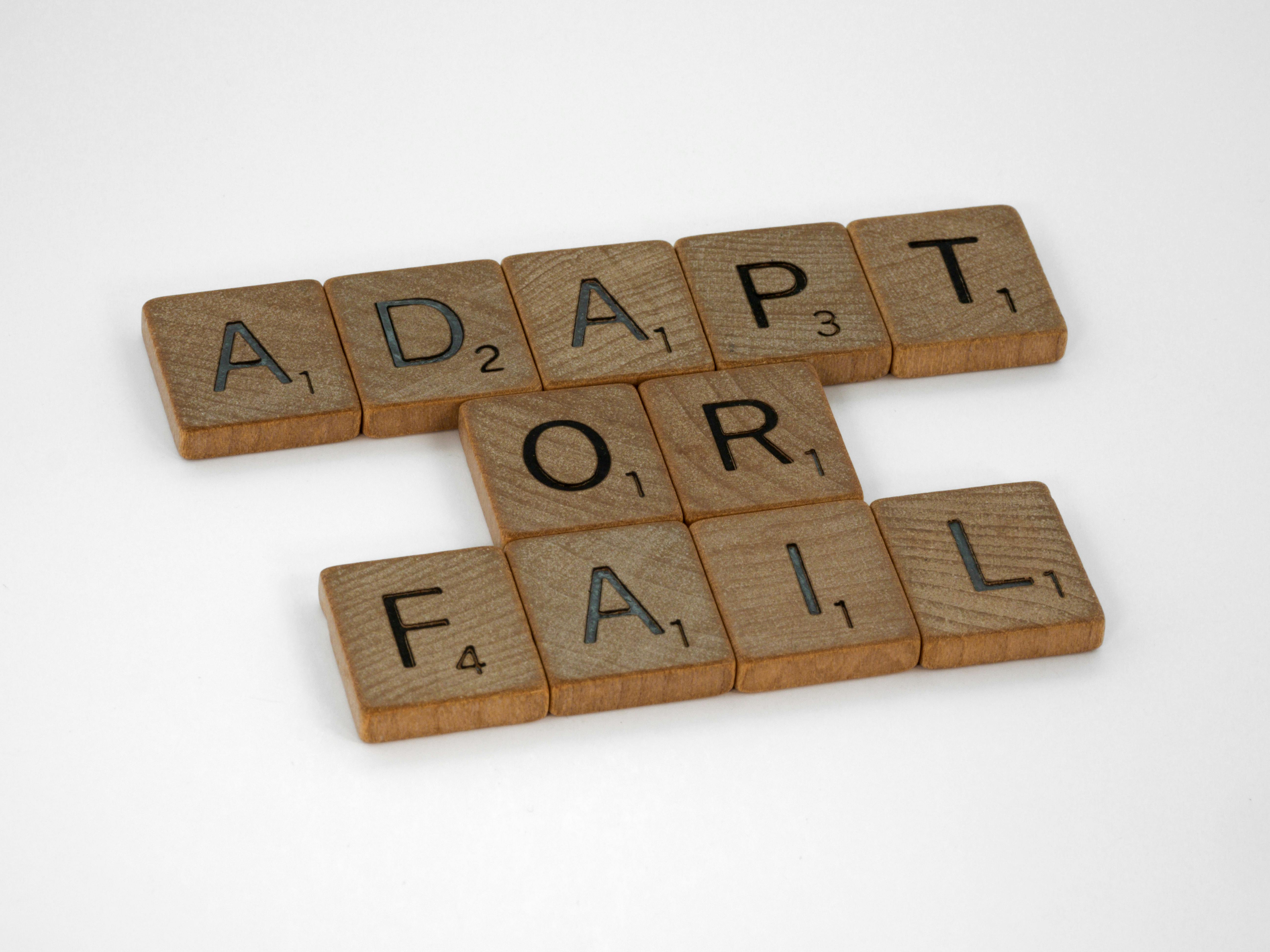In a rapidly evolving world, it’s crucial to embrace continuous learning and remain open to adapting your strategy. As the landscape of business and technology constantly shifts, being willing to acquire new knowledge and adjust your approach can give you a competitive edge. By staying curious, seeking out new information, and being flexible in your thinking, you can stay ahead of the game and ensure long-term success. Embracing continuous learning is not just about acquiring new skills, but also about evolving your mindset and staying agile in an ever-changing world. So, are you ready to embark on a journey of growth and adaptation?
The Importance of Continuous Learning
In today’s rapidly changing world, continuous learning has become more crucial than ever before. With advancements in technology, evolving industries, and emerging trends, it is essential to stay updated and adaptable. Continuous learning refers to the ongoing process of acquiring new knowledge, skills, and perspectives throughout one’s life. It is a mindset that not only fosters personal growth but also enhances professional development. By embracing continuous learning, you can gain numerous benefits and improve your overall strategy.
The Benefits of Continuous Learning
Continuous learning offers a multitude of benefits that can positively impact various aspects of your life. Firstly, it promotes personal growth and self-improvement. By constantly seeking new information and perspectives, you expand your knowledge base and develop a deeper understanding of the world around you. This continuous growth sparks creativity and innovation, allowing you to approach challenges and tasks from different angles.
Furthermore, continuous learning enhances professional development. It equips you with the necessary skills and knowledge to succeed in a rapidly evolving work environment. By staying updated on the latest trends and industry advancements, you can remain competitive and meet the demands of your job more effectively. Continuous learning also opens doors to new opportunities, including promotions, career transitions, and entrepreneurial ventures.
Additionally, continuous learning fosters adaptability and resilience. In a world that is constantly changing, being able to adapt to new circumstances is essential. Learning continuously helps you embrace change, see it as an opportunity, and navigate through it with confidence. By staying open to new ideas and perspectives, you become more flexible and capable of adjusting your strategy in accordance with evolving circumstances.

How Continuous Learning Can Improve Your Strategy
Continuous learning plays a crucial role in improving your strategy, whether it be in your personal or professional life. By constantly seeking new knowledge and perspectives, you gain a deeper understanding of the factors that influence your strategy. This enhanced understanding allows you to make informed decisions and refine your approach.
Continuous learning also enables you to stay ahead of competitors. In a rapidly changing world, stagnation can lead to obsolescence. By embracing continuous learning, you can remain at the forefront of your industry, anticipate emerging trends, and proactively adjust your strategy to capitalize on new opportunities.
Additionally, continuous learning enhances problem-solving skills. As you acquire new knowledge and perspectives, you develop a broader toolkit to approach challenges. This enables you to find creative solutions and overcome obstacles more effectively. By continuously learning, you become a more versatile and resourceful strategist.
Developing a Growth Mindset
Understanding the concept of a growth mindset is essential for embracing continuous learning. A growth mindset is the belief that intelligence, abilities, and talents can be developed through dedication and hard work. It is the opposite of a fixed mindset, which believes that intelligence and abilities are fixed traits that cannot be changed.
Recognizing and overcoming fixed mindset barriers is crucial for fostering a growth mindset. Fixed mindset barriers include self-limiting beliefs, fear of failure, and a reluctance to step out of one’s comfort zone. By acknowledging and challenging these barriers, you can create a mental shift that embraces challenges, views failures as learning opportunities, and sees effort as the path to growth.
Tips for cultivating a growth mindset include seeking out challenges and embracing failure as a stepping stone towards improvement. It is also important to focus on the process rather than the outcome, celebrate progress and effort, and surround yourself with like-minded individuals who inspire and support your growth mindset.

Embracing a Learning Culture
Creating a supportive learning environment is essential for embracing continuous learning. In such an environment, individuals are encouraged to seek out new knowledge, share their insights, and collaborate with others. This fosters a culture of curiosity, growth, and innovation.
One way to create a supportive learning environment is by encouraging collaboration and knowledge sharing. By facilitating opportunities for individuals to exchange ideas and expertise, you create a space where learning becomes a collective endeavor. This can be achieved through team projects, group discussions, or mentorship programs.
Providing resources and opportunities for growth is also crucial. This can include offering training programs, access to educational materials, or organizing workshops and seminars. By investing in the growth and development of your team members, you create an environment that values continuous learning and supports their professional goals.
The Role of Reflection in Learning
Reflection is an essential component of continuous growth and learning. It involves taking the time to critically analyze and evaluate your experiences, actions, and goals. Reflection allows you to gain insights into your strengths and weaknesses, identify areas for improvement, and make informed decisions moving forward.
One of the key reasons why reflection is essential for continuous growth is because it helps consolidate and integrate new knowledge. By reflecting on what you have learned, you can deepen your understanding and make connections between different concepts. This enhances retention and promotes long-term learning.
There are different methods of reflection that you can incorporate into your learning process. Journaling is one effective method where you write about your experiences, thoughts, and lessons learned. Another method is engaging in group discussions or seeking feedback from mentors or peers. Reflective exercises such as mind mapping or self-assessments can also aid in the reflection process.
To effectively incorporate reflection into your learning process, it is important to set aside dedicated time for reflection. This can be done daily, weekly, or after completing a significant learning experience. By making reflection a regular practice, you can maximize the benefits of continuous learning.

Finding the Right Learning Opportunities
Identifying the most relevant and valuable learning opportunities is crucial for continuous learning. With a myriad of options available, it is important to prioritize those that align with your goals and provide the most substantial learning outcomes.
To identify the most relevant learning opportunities, it is important to assess your current knowledge and skills. Determine what areas you would like to develop or improve upon. This self-assessment will guide you in identifying the specific topics or skills you should focus on.
Exploring various learning channels is important as well. Traditional methods such as workshops, seminars, and conferences can provide valuable insights. However, online learning platforms have become increasingly popular due to their convenience and accessibility. By leveraging online resources, you can access a diverse range of courses, tutorials, and webinars.
Maximizing the benefits of online learning requires discipline and self-motivation. Create a structured learning schedule, set specific goals, and hold yourself accountable. Actively engage with the content, participate in discussions, and seek clarification when needed. By taking full advantage of online learning, you can continuously acquire new knowledge and skills.
Fostering Curiosity and Exploration
Curiosity is closely linked to continuous learning. It is the desire to seek new information, experiences, and perspectives. By cultivating curiosity, you can fuel your passion for learning and foster a mindset of exploration.
To enhance curiosity and exploration, it is important to expose yourself to diverse ideas and perspectives. Engage in conversations with individuals from different backgrounds, industries, or disciplines. Attend events or conferences that cover topics outside of your immediate area of expertise. By embracing new ideas and perspectives, you broaden your horizons and challenge your existing beliefs.
Techniques such as asking questions, conducting research, and experimenting also contribute to curiosity and exploration. By asking thought-provoking questions, you encourage critical thinking and spark curiosity in yourself and others. Conducting research allows you to delve into topics of interest and gain a deeper understanding. Experimenting with new approaches or ideas enables you to apply theoretical knowledge in real-world scenarios and learn through hands-on experience.

Adapting Your Strategy Through Learning
Continuous learning enables you to adapt your strategy as circumstances evolve. It provides you with the necessary tools and insights to recognize when adjustments are needed and make informed decisions.
Understanding the need for ongoing strategy adjustments is crucial. In a rapidly changing world, what worked yesterday may not work tomorrow. By continuously monitoring your progress, evaluating results, and staying updated on industry trends, you can stay ahead of the curve and proactively adjust your strategy.
Leveraging data and feedback is essential for informed decision-making. Collect and analyze relevant data that can provide insights into your strategy’s effectiveness. This can include metrics such as revenue growth, customer feedback, or employee satisfaction. By listening to feedback from customers, employees, and stakeholders, you gain a deeper understanding of their needs and can make strategic adjustments accordingly.
Tips for effectively implementing strategy changes include involving key stakeholders in the process, communicating clearly, and fostering a culture of agility. Embrace experimentation and be open to taking calculated risks. By continuously learning and adapting your strategy, you increase the likelihood of achieving your desired outcomes.
Building a Personal Learning Network
Building a personal learning network is valuable for continuous learning. A personal learning network comprises like-minded individuals who share similar interests and goals. By connecting with others, you can gain insights, broaden your perspectives, and tap into diverse expertise.
The value of connecting with like-minded individuals cannot be overstated. By surrounding yourself with individuals who are passionate about learning, you create a supportive and inspiring community. They can offer different viewpoints, share resources, and provide feedback or guidance.
Building a diverse and supportive network involves actively seeking out individuals from various backgrounds, industries, or areas of expertise. Attend networking events, join professional organizations or online communities, and engage in conversations. Take the initiative to share your own knowledge and experiences as well. By contributing to the network, you build trust and attract individuals who are eager to collaborate and learn with you.
Utilizing social media and professional platforms is an effective way to expand your personal learning network. Platforms like LinkedIn, Twitter, and specialized forums allow you to connect with professionals from around the world. Participate in industry-related discussions, share educational content, and engage with others’ posts. By leveraging digital platforms, you can continually expand your network and tap into a wealth of knowledge and resources.
Overcoming Learning Challenges
Continuous learning is not without its challenges. Identifying and overcoming these challenges is crucial for maintaining momentum and achieving your learning goals.
Identifying common obstacles to continuous learning is the first step in overcoming them. Time constraints, competing priorities, and a lack of motivation or discipline are some common challenges. Recognize these obstacles as opportunities for growth and commit to finding solutions.
Strategies for overcoming learning barriers include creating a structured learning schedule, setting priorities, and breaking down learning tasks into manageable steps. Develop strategies to optimize your time management skills and eliminate distractions. Stay motivated by setting clear goals, rewarding yourself for progress, and reminding yourself of the benefits of continuous learning. Surrounding yourself with a supportive network that holds you accountable can also be beneficial.
If you find yourself struggling to overcome learning challenges, do not hesitate to seek support and mentorship. Reach out to peers, mentors, or professionals with expertise in the areas you are pursuing. They can offer guidance, advice, and encouragement. Joining study groups or finding an accountability partner can also provide additional support and motivation.
Measuring the Impact of Continuous Learning
Methods for tracking and evaluating learning outcomes are essential for measuring the impact of continuous learning. By assessing the effectiveness of your learning efforts, you can refine your approach and make informed decisions moving forward.
One method for tracking learning outcomes is self-assessment. Regularly evaluate your progress and reflect on how your learning has impacted your knowledge and skills. Set benchmarks and compare your current performance to your initial starting point.
Collecting feedback from others is another valuable method for measuring the impact of continuous learning. Seek feedback from colleagues, supervisors, or clients. This can provide insights into how your learning has influenced your work or contributed to your professional growth.
Developing metrics and benchmarks specific to your learning goals is crucial. Determine the key indicators of success and establish measurable targets. For example, if your learning goal is to improve your public speaking skills, you can track the number of presentations you have delivered, the feedback received, or the level of confidence you feel during presentations. By establishing specific metrics, you can gauge the progress you are making and make adjustments to your learning approach if necessary.
Using feedback to refine your learning approach is essential. Take the feedback you receive and incorporate it into your future learning endeavors. Adapt your strategies, seek out new learning opportunities, and continuously improve.
By consistently tracking and evaluating your learning outcomes, you can ensure that you are making progress and maximize the benefits of continuous learning.
Continuous learning is a cornerstone of personal and professional growth. In today’s ever-changing world, it is imperative to embrace the mindset of continuous learning and adapt our strategies accordingly. By recognizing the importance of continuous learning, realizing its benefits, and actively incorporating it into our lives, we can thrive in a rapidly changing environment. So, stay open to learning, cultivate a growth mindset, create a supportive learning environment, reflect on your experiences, seek relevant learning opportunities, and measure the impact of your learning. Continuous learning is a lifelong journey that can lead to personal fulfillment, professional success, and a future-proof strategy.

